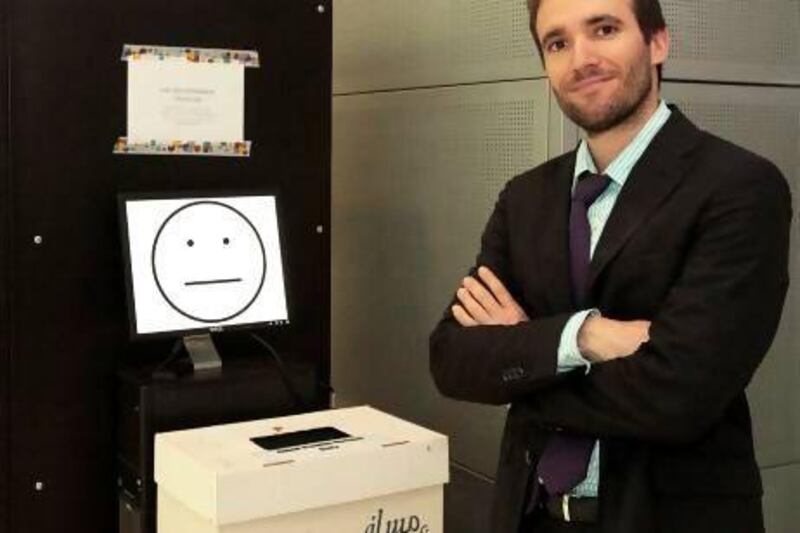Students and staff from UAE University have made the mundane task of recycling a much more rewarding, and fun, experience.
A team headed by Dr Jose Berengueres, assistant professor at the university, gave the traditional recycling bin used to collect plastic bottles a makeover using an emoticon – a pictorial representation of an emotion – to encourage users to recycle.
And what better way to encourage people than with a smile.
Once a polythene terephthalate (Pet) bottle is placed into the recycling bank, the device makes the sound of clinking coins and a smiley face appears on an LCD screen above it.
"A lot of research shows that this works," said Dr Berengueres, who believes simple, fun rewards work better than offers of cash or other material incentives.
The team's tests to see whether the "smiling bin" would encourage more people to recycle proved positive.
Over the course of four weeks, 103 bottles were collected in a normal recycling bin placed in the lobby of the university's IT department building. Weekly numbers over the period varied from a low of 25 to a high of 27 bottles.
This was compared with the new-look "smiling bin" placed in the same location from another four weeks. The new bin collected 360 bottles. The lowest number of bottles collected within a week in that period was 85, the most was 95.
For Dr Berengueres, the findings were not surprising . "We used just a smile and it has been a huge success."
The bin took five weeks to conceive and produce. The modification cost about Dh1,500 – the cost of a simple computer, a sensor to detect bottles being placed inside and the LCD screen displaying the emoticon.
Emirati student Fatma Al Suwairi wrote the software code that produced the smiley face response. Two other students, Huda Al Hameidy and Alia Al Mazrouei, helped count the bottles collected.
The team is now testing another device, produced with the help of Tony Ng, instructor for enterprise systems at the university, this time at a lower cost by using an Android tablet.
It is being tested at Al Ain's Al Raqia high school.
"Nearly 300 bottles were collected within the first two weeks of the experiment and the team is expecting data for the next two weeks," said Dr Berengueres, who is presenting the findings at a robotics conference in Japan next month.
The team is working on further improvements to reduce the cost of its system. Dr Berengueres is also talking to government authorities and businesses about rolling out similar devices.
"Our system can raise awareness of recycling without spending money on ads, also it is visual so it's cross-cultural," he said.
The UAE has one of the world's highest waste-generation rates and very little of that waste is recycled.
Studies carried out in 2010 estimated that Abu Dhabi residents produced between 1.8kg and 2.4kg per person per day. If the trajectory remains the same, the Abu Dhabi Government could be spending as much as Dh22 billion a year on waste management by 2030.
vtodorova@thenational.ae





